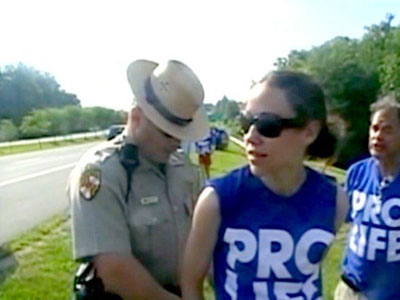A federal judge has ruled in favor of pro-life advocates, including college-aged girls, who were shacked and strip searched after peacefully protesting abortion in Maryland in 2008. The multi-faceted case has been ongoing for years and some of the defendants have settled.
Maryland state troopers handcuffed and arrested 18 pro-life advocates for sharing a peaceful pro-life message along a Bel Air, Maryland public street in August 2008. Among those arrested were three young women who were later shackled, strip-searched, and detained overnight by other police.
On Tuesday, Hon. Richard D. Bennett of the federal district court for the District of Maryland issued a 49-page opinion in a civil rights action filed by attorneys with the American Catholic Lawyers Association in 2009. The decision, following extensive motions for summary judgment by both plaintiffs and defendants, holds that the First and Fourth Amendment rights of the seven pro-life advocates who are the plaintiffs (as well as two pro-life advocates represented by the Alliance Defense Fund) were violated when the state troopers arrested and jailed them.
The plaintiffs’ First and Fourth Amendment claims against the Troopers will proceed to a jury trial for the assessment of damages only, according to pro-life attorney Christopher Ferrara, who is handling the case.
 “[A] reasonable police officer faced with the facts confronted by the Defendants would have known that, in ordering the demonstrators to leave Harford County, he would violate the Plaintiffs’ First Amendment rights,” the court ruled. “Moreover, arresting the Plaintiffs for exercising those rights was a violation of the Plaintiffs’ Fourth Amendment rights. In engaging in this manifestly unlawful behavior, the individual officers could not have reasonably misapprehended the law, nor can it be said that they made a bad guess in a gray area.”
“[A] reasonable police officer faced with the facts confronted by the Defendants would have known that, in ordering the demonstrators to leave Harford County, he would violate the Plaintiffs’ First Amendment rights,” the court ruled. “Moreover, arresting the Plaintiffs for exercising those rights was a violation of the Plaintiffs’ Fourth Amendment rights. In engaging in this manifestly unlawful behavior, the individual officers could not have reasonably misapprehended the law, nor can it be said that they made a bad guess in a gray area.”
“We are gratified by the court’s comprehensive decision, and we are preparing to move ahead to a final resolution of this case,” Ferrara, the president of the American Catholic Lawyers Association, told LifeNews in a statement.
The pro-life advocate plaintiffs in the case, Ames, et al. v. Colonel Terrence Sheridan, are represented by Ferrara while ACLA attorneys Denis Brenan and Howard Walsh, III, assisted by local counsel Matt Paavola, are also involved. Another plaintiff in the action, the organization Defend Life, Inc., is represented by attorneys Tom Brejcha and Pat Gillen of the Thomas More Society in Chicago.
In January, the Fourth Circuit U.S. Court of Appeals rejected an appeal taken by defendant police officers in a suit brought by Defend Life, a Maryland pro-life group that sponsored the event featuring pro-life signs held along a busy street. The court granted a motion to dismiss the appeal filed by Thomas More Society’s special counsel.
The appeals court dismissed the appeal on the grounds that material questions of fact were presented as to whether the police defendants acted in good faith. Indeed, plaintiffs already adduced compelling evidence of bad faith, including legally baseless arrests followed by failure to prosecute belated criminal charges, needless strip searches of fully peaceable, nonviolent demonstrators, and 911 tapes and police recordings. The recordings showed how police enforced a “heckler’s veto” (acting on phone calls objecting to the content of protest signs) in making the arrests, and showing deep police bias — with officers commenting “…they can sit in a cell for an hour … or three or four and rot.”
During the initial event, the pro-life people were arrested without warning by Harford County State Troopers during their multi-city protest featuring abortions signs. At least a dozen police officers arrived in more than seven marked vehicles.
They had started their peaceful pro-life event along a public road in Harford County but relocated to the town of Bel Air after being told by officers to leave the county for not having a county permit to engage in free speech activities. The officers then arrested them in Bel Air without explanation.
Once in custody, three young women among the group arrested–two of whom were teenagers–were subjected to two rounds of strip searches. Only after the strip searches and a night spent in jail were they told why they were arrested.
The first search took place in the police station parking lot in front of other males. A female officer pulled out the young ladies’ shirt collars to inspect their breasts before reaching down their pants to feel around their waistlines.
The Harford County Detention Center administered the second strip search after the pro-life participants were transferred there. A female officer took the women one by one into a bathroom with a partially open door and ordered them to lift up their shirts and brassieres. Officials cast the pro-life participants in leg irons, denied them permission to call parents until after midnight.
A week after their release, the state dropped the charges ultimately filed against them: loitering, disorderly conduct, and failure to obey a lawful order. None of the participants were ever charged with any sort of permit violation.







